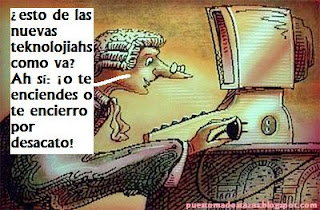Y I am not referring to Alfonso Rojo and colleagues do not have constitutional protection in Digital Mass Media (I stress with all caps), if not all online journalists of all Media (Again in capital letters, yes) that exist in this universe that is the Internet.
This is, and unfortunately I do not exaggerate, the conclusion drawn from the Judgement of the Criminal Justice Rodriguez Fernandez in court Madrid imposed on the director of Cadena Ser, Daniel Anido and its director Rodolfo Irago Information Services. And that progress from the beginning, has been appealed.
This controversial sentence imposed on convicted one year and nine months imprisonment, suspension from duty and fines of more than 130,000 euros for a crime of secrecy.
things first, seeing this excessive sentence what is that the crime of divulging secrets? Article 197 of the Penal Code provides that in paragraph three that "imprisonment shall be imposed ... if you reveal broadcast or transfer data to third parties ... to relate the above numbers." These data are "reserved for personal or family nature."
As these journalists published on the website of the station (page, let me stress, which normally publishes news) a list with the names of 78 militants affiliated irregularly PP, the judge ( and fiscal course) has found that publishing this information, journalists have committed the crime.
But now it makes sense to think: if this is a clash between two rights, the right of free communication of truthful information to journalists and the confidentiality of the data (privacy? ), the judge must be resolved under the doctrine of constitutional court to balance, and have noticed if it was a news and information of a true (treated in a diligent blablabla ...) to know which of the two rights prevails here. Well, the court itself has recognized that truthful information and the nature of news itself.
So why they have been convicted?
Well-roll of drums, because these reporters did not act to exercise freely their right to communicate truthful information by a broadcast medium (as the well-known Article 20 EC ) because, more drums in the words of the sentence:
"The constitutional protection of the right to information concerning the media social communication -television, radio or newspapers, "but must be qualified that the Internet is not a social media sense, but universal."
Chanáaan! I nternet is not a means of social communication in the strict sense, but universal. Then publish to a website a means of communication, it is published in a media ("comor ?). For gentlemen, future journalists and now, according to the judge: only have constitutional protection professionals working in television, radio and print media. So what happens to all those working in digital media? In the so-called media of the future! For something like garlic and water.
One of two, or all of these professionals live in a parallel world and have not heard that there is online social media - for whom they are working then? What is happening? - Or this man judge needs quickly update. (But wait, just do not know that such things exist).
only remains to say thank goodness that this gentleman does not work in the Constitutional Court (final safeguard our fundamental rights and creator of doctrine), but neither is that in the latter body are very updated, but that deserves another separate post.

0 comments:
Post a Comment